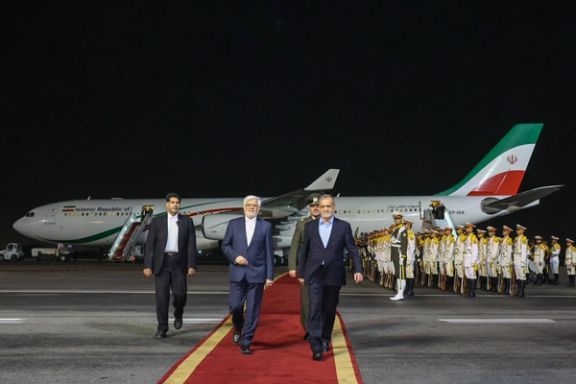Iranian media, experts debate Pezeshkian's New York outcome

As President Massoud Pezeshkian returned to Tehran after attending the UN General Assembly in New York, Iranian media were abuzz, analyzing his actions and accomplishments during the trip.

As President Massoud Pezeshkian returned to Tehran after attending the UN General Assembly in New York, Iranian media were abuzz, analyzing his actions and accomplishments during the trip.
Media focus on President Pezeshkian and Iran’s hopes to gain something from his largely low-key meetings in New York sharply contrasts with the public's attention on two other events: the football derby where Persepolis defeated Esteghlal, and a high-profile interview on Iran International TV with pop icon Shahram Shabpareh, who has entertained Iranians for nearly 60 years, spending 45 of those years in exile in the United States.
Iranian media are eager to uncover what truly transpired in New York and whether the factional debate over Pezeshkian's success or failure holds any merit. Pro-reform website Fararu noted in a Thursday report, "What’s been said publicly isn’t the issue—people want to know what happened behind the scenes." The report added that observers are approaching media coverage of Pezeshkian’s visit to New York "with a certain degree of caution."
The website also quoted Foreign Minister Araghchi as saying that "Iran is looking for a dignified way to revive the 2015 nuclear deal while it needs to reassure" the United States and Europe about the peacefulness of its ambitious nuclear program.
In an interview with Fararu, political analyst Rahman Ghahramanpour observed that European diplomats in New York approached the Islamic Republic with "a cautious sense of hope." He noted, "Their attitude was less pessimistic than it was toward former President Raisi, but not as optimistic as it had been with Rouhani’s team."
Commenting on the term "dignified" used by Araghchi, Ghahramanpour explained that it aligns with Khamenei's call for "dignified, thoughtful, and prudent" diplomacy. He added that the Pezeshkian administration needs an agreement with the West to strengthen its position against political rivals in Tehran. However, he pointed out that a potential nuclear deal faces opposition in both Tehran and Washington.
Fararu also quoted economist Morteza Afghah, who said Pezeshkian is under pressure to improve the country's economic situation. Afghah suggested that it was these economic pressures that led Iranian officials to adopt a softer tone in New York and move toward re-establishing diplomatic relations with the West after seven years. However, he did not comment on how this shift might affect Iran's ties with its new partners, Russia and China.
Another political observer in Tehran Abdolreza Faraji-Rad told Fararu that Pezeshkian has loud opponents in Tehran who control the country's state television and in order not to come under attack by them, he needs to coordinate his actions with "higher up", presumably meaning Supreme Leader Ali Khamenei.
Even when Pezeshkian faced backlash from hardliners over his controversial remarks in New York about mutual disarmament between Iran and Israel and calling on international organizations to restore security in the Middle East, some argued it wasn’t a slip of the tongue or a sign of political naivete. Instead, they suggested it indicated he had received approval from Khamenei to make such a bold statement.
Meanwhile, Ghahramanpour had another interview the centrist website Entekhab in Tehran in which he said "At the time being there is very little chance for an open, direct and comprehensive negotiations with the United States, but this does not mean there will be no negotiations." He added: "It appears the two sides have accepted to talk about the nuclear issue at a lower level and wait for a proper situation after the US Presidential elections."
Despite the meeting between Macron and Pezeshkian during which Macron called for the release of French hostages in jail in Tehran, according to Ghahramanpour, resumption of talks with Europe is likely to take place only with "medium priority" as the continuation of the meeting with the French was headed by Deputy Foreign Minister Majid Takht Ravanchi.